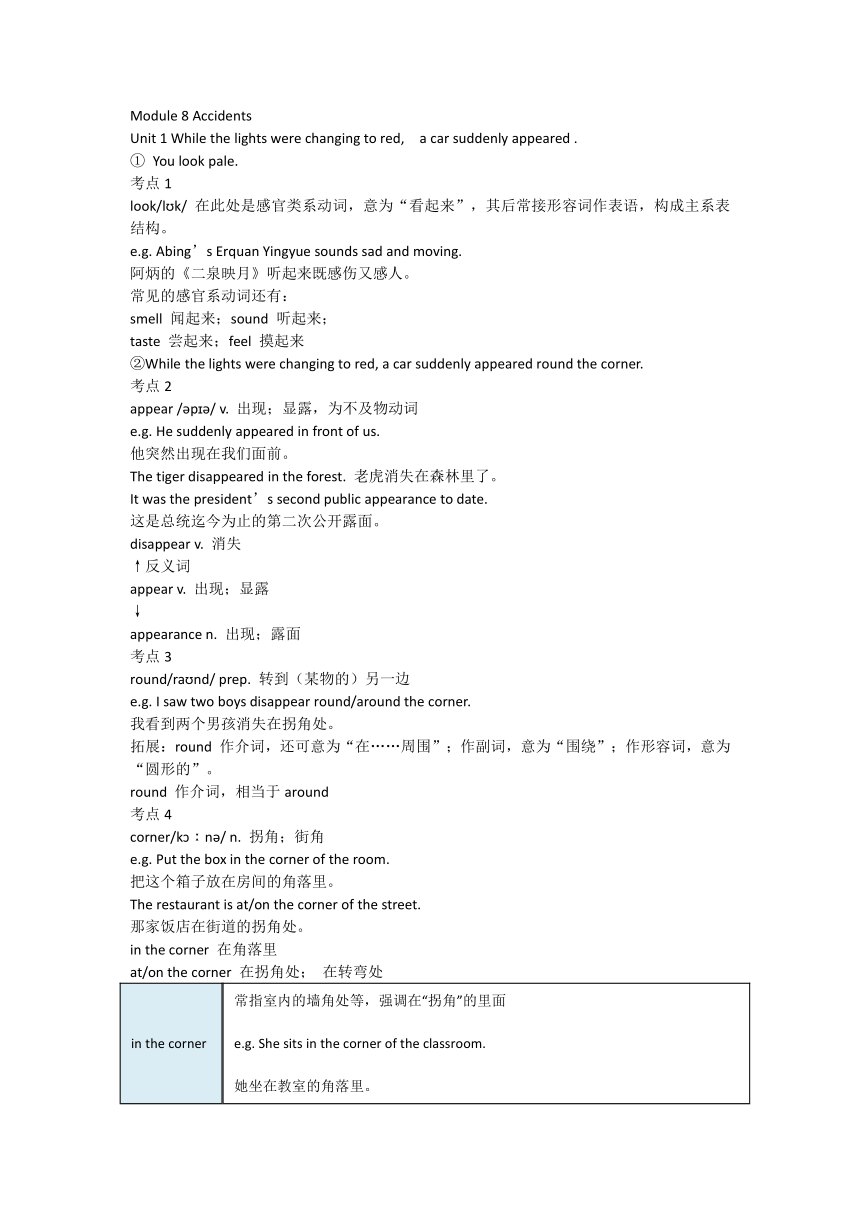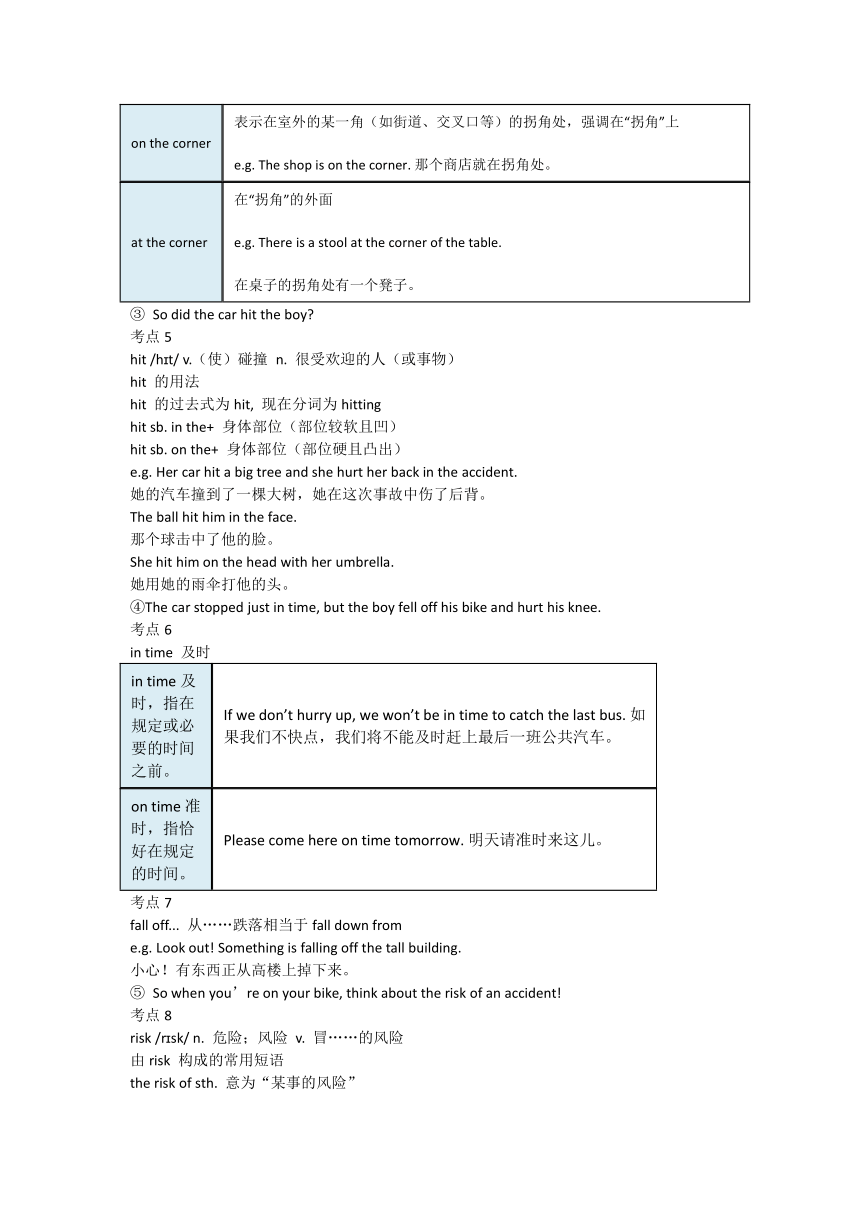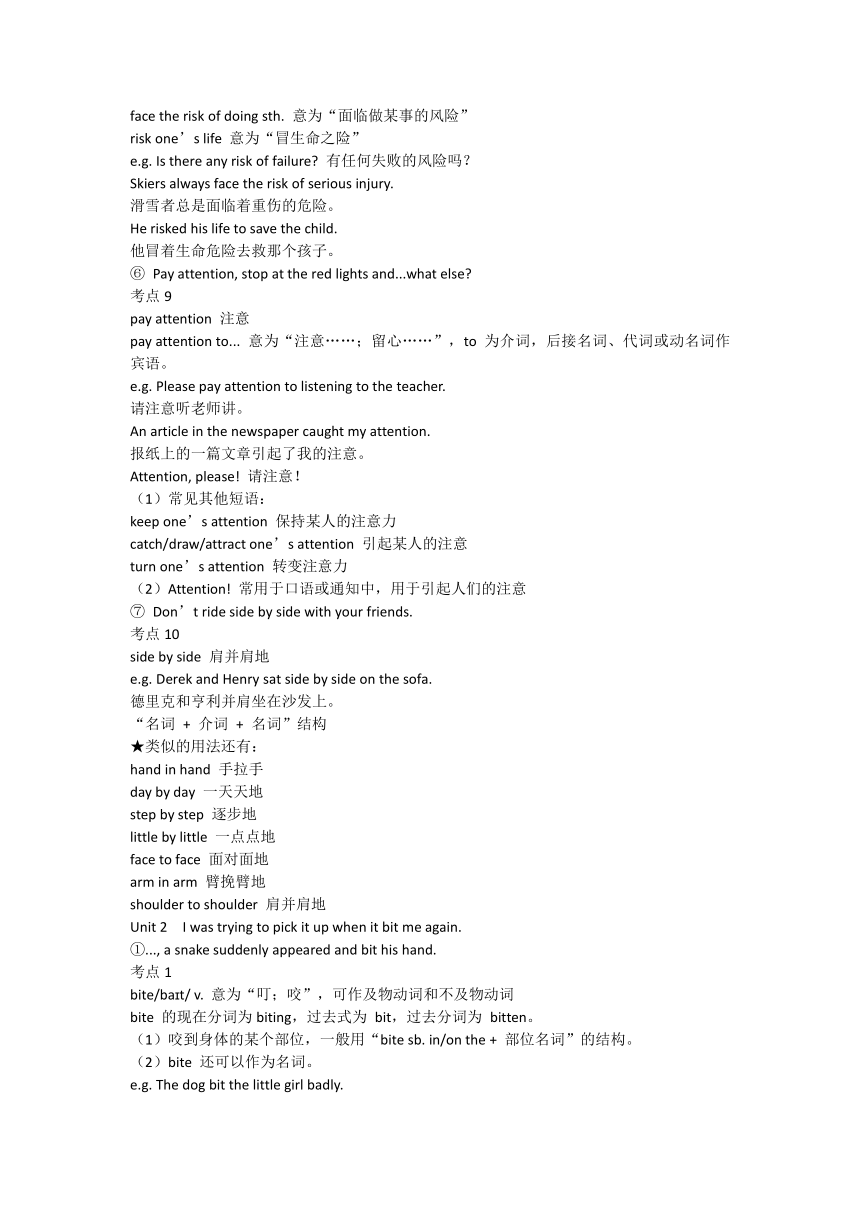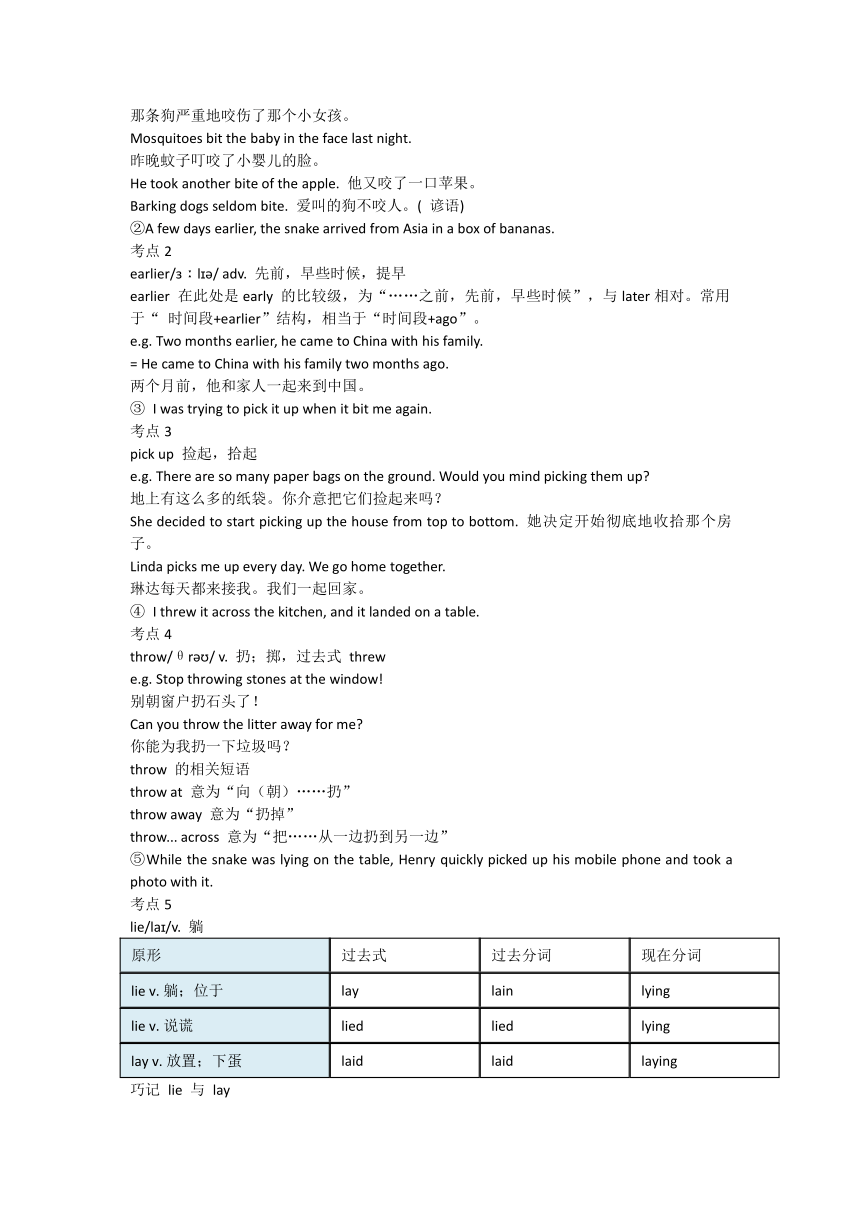Module 8 Accidents 知识点讲义
文档属性
| 名称 | Module 8 Accidents 知识点讲义 |  | |
| 格式 | docx | ||
| 文件大小 | 26.0KB | ||
| 资源类型 | 教案 | ||
| 版本资源 | 外研版 | ||
| 科目 | 英语 | ||
| 更新时间 | 2023-09-09 07:09:05 | ||
图片预览




文档简介
Module 8 Accidents
Unit 1 While the lights were changing to red, a car suddenly appeared .
① You look pale.
考点1
look/l k/ 在此处是感官类系动词,意为“看起来”,其后常接形容词作表语,构成主系表结构。
e.g. Abing’s Erquan Yingyue sounds sad and moving.
阿炳的《二泉映月》听起来既感伤又感人。
常见的感官系动词还有:
smell 闻起来;sound 听起来;
taste 尝起来;feel 摸起来
②While the lights were changing to red, a car suddenly appeared round the corner.
考点2
appear / p / v. 出现;显露,为不及物动词
e.g. He suddenly appeared in front of us.
他突然出现在我们面前。
The tiger disappeared in the forest. 老虎消失在森林里了。
It was the president’s second public appearance to date.
这是总统迄今为止的第二次公开露面。
disappear v. 消失
↑反义词
appear v. 出现;显露
↓
appearance n. 出现;露面
考点3
round/ra nd/ prep. 转到(某物的)另一边
e.g. I saw two boys disappear round/around the corner.
我看到两个男孩消失在拐角处。
拓展:round 作介词,还可意为“在……周围”;作副词,意为“围绕”;作形容词,意为“圆形的”。
round 作介词,相当于around
考点4
corner/k n / n. 拐角;街角
e.g. Put the box in the corner of the room.
把这个箱子放在房间的角落里。
The restaurant is at/on the corner of the street.
那家饭店在街道的拐角处。
in the corner 在角落里
at/on the corner 在拐角处; 在转弯处
in the corner 常指室内的墙角处等,强调在“拐角”的里面 e.g. She sits in the corner of the classroom. 她坐在教室的角落里。
on the corner 表示在室外的某一角(如街道、交叉口等)的拐角处,强调在“拐角”上 e.g. The shop is on the corner. 那个商店就在拐角处。
at the corner 在“拐角”的外面 e.g. There is a stool at the corner of the table. 在桌子的拐角处有一个凳子。
③ So did the car hit the boy
考点5
hit /h t/ v.(使)碰撞 n. 很受欢迎的人(或事物)
hit 的用法
hit 的过去式为hit, 现在分词为hitting
hit sb. in the+ 身体部位(部位较软且凹)
hit sb. on the+ 身体部位(部位硬且凸出)
e.g. Her car hit a big tree and she hurt her back in the accident.
她的汽车撞到了一棵大树,她在这次事故中伤了后背。
The ball hit him in the face.
那个球击中了他的脸。
She hit him on the head with her umbrella.
她用她的雨伞打他的头。
④The car stopped just in time, but the boy fell off his bike and hurt his knee.
考点6
in time 及时
in time及时,指在规定或必要的时间之前。 If we don’t hurry up, we won’t be in time to catch the last bus. 如果我们不快点,我们将不能及时赶上最后一班公共汽车。
on time 准时,指恰好在规定的时间。 Please come here on time tomorrow. 明天请准时来这儿。
考点7
fall off... 从……跌落相当于fall down from
e.g. Look out! Something is falling off the tall building.
小心!有东西正从高楼上掉下来。
⑤ So when you’re on your bike, think about the risk of an accident!
考点8
risk /r sk/ n. 危险;风险 v. 冒……的风险
由risk 构成的常用短语
the risk of sth. 意为“某事的风险”
face the risk of doing sth. 意为“面临做某事的风险”
risk one’s life 意为“冒生命之险”
e.g. Is there any risk of failure 有任何失败的风险吗?
Skiers always face the risk of serious injury.
滑雪者总是面临着重伤的危险。
He risked his life to save the child.
他冒着生命危险去救那个孩子。
⑥ Pay attention, stop at the red lights and...what else
考点9
pay attention 注意
pay attention to... 意为“注意……;留心……”,to 为介词,后接名词、代词或动名词作宾语。
e.g. Please pay attention to listening to the teacher.
请注意听老师讲。
An article in the newspaper caught my attention.
报纸上的一篇文章引起了我的注意。
Attention, please! 请注意!
(1)常见其他短语:
keep one’s attention 保持某人的注意力
catch/draw/attract one’s attention 引起某人的注意
turn one’s attention 转变注意力
(2)Attention! 常用于口语或通知中,用于引起人们的注意
⑦ Don’t ride side by side with your friends.
考点10
side by side 肩并肩地
e.g. Derek and Henry sat side by side on the sofa.
德里克和亨利并肩坐在沙发上。
“名词 + 介词 + 名词”结构
★类似的用法还有:
hand in hand 手拉手
day by day 一天天地
step by step 逐步地
little by little 一点点地
face to face 面对面地
arm in arm 臂挽臂地
shoulder to shoulder 肩并肩地
Unit 2 I was trying to pick it up when it bit me again.
①..., a snake suddenly appeared and bit his hand.
考点1
bite/ba t/ v. 意为“叮;咬”,可作及物动词和不及物动词
bite 的现在分词为biting,过去式为 bit,过去分词为 bitten。
(1)咬到身体的某个部位,一般用“bite sb. in/on the + 部位名词”的结构。
(2)bite 还可以作为名词。
e.g. The dog bit the little girl badly.
那条狗严重地咬伤了那个小女孩。
Mosquitoes bit the baby in the face last night.
昨晚蚊子叮咬了小婴儿的脸。
He took another bite of the apple. 他又咬了一口苹果。
Barking dogs seldom bite. 爱叫的狗不咬人。( 谚语)
②A few days earlier, the snake arrived from Asia in a box of bananas.
考点2
earlier/ l / adv. 先前,早些时候,提早
earlier 在此处是early 的比较级,为“……之前,先前,早些时候”,与later相对。常用于“ 时间段+earlier”结构,相当于“时间段+ago”。
e.g. Two months earlier, he came to China with his family.
= He came to China with his family two months ago.
两个月前,他和家人一起来到中国。
③ I was trying to pick it up when it bit me again.
考点3
pick up 捡起,拾起
e.g. There are so many paper bags on the ground. Would you mind picking them up
地上有这么多的纸袋。你介意把它们捡起来吗?
She decided to start picking up the house from top to bottom. 她决定开始彻底地收拾那个房子。
Linda picks me up every day. We go home together.
琳达每天都来接我。我们一起回家。
④ I threw it across the kitchen, and it landed on a table.
考点4
throw/θr / v. 扔;掷,过去式 threw
e.g. Stop throwing stones at the window!
别朝窗户扔石头了!
Can you throw the litter away for me
你能为我扔一下垃圾吗?
throw 的相关短语
throw at 意为“向(朝)……扔”
throw away 意为“扔掉”
throw... across 意为“把……从一边扔到另一边”
⑤While the snake was lying on the table, Henry quickly picked up his mobile phone and took a photo with it.
考点5
lie/la /v. 躺
原形 过去式 过去分词 现在分词
lie v. 躺;位于 lay lain lying
lie v. 说谎 lied lied lying
lay v. 放置;下蛋 laid laid laying
巧记 lie 与 lay
规则的撒谎,不规则的躺;
躺过就下蛋,下蛋不规则。
一语辨异:
e.g. The man lying there lies that he laid the money on the table.
躺在那里的人撒谎说他把钱放在桌子上了。
⑥ As the doctors were checking him, the pain got worse.
考点6
pain /pe n/ n. 痛;疼痛
have a pain in/on+ 身体部位 感觉……疼痛
in great/ a lot of pain 处于极大的痛苦之中
pain n. 痛;疼痛 v. 使痛苦
↓
painful adj. 令人疼痛的
e.g. The boy cried with pain. 男孩疼得哭了起来。
My mother had a pain in her back. 我母亲背疼。
She was in great pain. 她非常痛苦。
考点7
worse /w s/ adj. 更坏的;更糟的 adv. 更糟;更严重
e.g. The traffic jam is much worse after five o’clock.
五点后交通拥堵严重得多。
If she’s worse in the morning, I’ll call the doctor.
如果她早上病情加重,我就去请医生来。
worse 是bad 和badly的比较级。其反义词是better。
⑦As soon as they learnt what kind of snake bit him, they gave Henry the right medicine, and he left hospital the next day.
考点8
as soon as 一……就……
as soon as 常用来引导时间状语从句,在下列情况下,
从句使用一般现在时:
(1)主句为一般将来时;
(2)主句为祈使句;
(3)主句中含有情态动词。
e.g. I’ll go to visit my aunt in England as soon as the summer holiday starts. 暑假一开始我就去英国看望姑妈。
Let’s start as soon as he comes. 他一来我们就开始。
As soon as they arrived, they began to work.
他们一到达就开始工作了。
考点9
medicine/medsn/ n. 药;药物
e.g. Take the medicine and you’ll feel better soon.
吃了药,你很快就会感觉好多了。
吃药:take
have the medicine
medicine n. 药;药物→ medical adj. 医学的;医疗的
Unit 3
Language in use
①One plane was coming from Paris and the other was coming from New York.
考点1
one... and the other... 意为“一个……另一个……”
other “其他”,不可单独使用,其后接可数名词复数。
the other 指“(两者中)另一个”,常构成固定搭配one... and the other... 。
another “(三者或三者以上中)另一个,又一个”,可作代词;也可作限定词,此时其后接可数名词单数。
others “其他的人/ 物”,表示泛指,相当于代词,其后不可再接名词。
the others “剩下的全部”,表示特指,相当于代词,其后不可再接名词。
② He broke his leg and was in hospital for over a month.
考点2
in hospital(生病)住院
e.g. His grandfather was badly ill in hospital.
他的爷爷生重病住院了。
He stands in front of a hospital and says he works in the hospital.
他站在一所医院前面说他就在这所医院上班。
① in hospital (生病)住院
② in the/a hospital 在医院里,特指说话双方都知道的医院(the) 或泛指某一家医院(a)。
考点3
over/ v (r)/ prep. 意为“多于,超过”,相当于more than
e.g. My grandfather is over ninety, but he is in good health.
我的爷爷九十多岁了,但是他很健康。
③ After the two accidents, he promised to take my advice.
考点4
promise /pr m s/ v. 承诺
promise to do sth. 承诺做某事
promise sb. sth. =promise sth. to sb. 向某人承诺某物
promise sb. the moon/the earth 向某人夸下海口
e.g. She has promised to do all she can to help.
她答应尽力帮忙。
拓展:promise 作名词,常见短语:
make a promise 许下诺言;
keep the promise 信守诺言;
break the promise 不遵守诺言
④US Airways Flight 1549 took off as usual from an airport in New York.
考点5
take off 起飞;脱下
★与take 有关的常见短语:
take back 退回 take up 占用
take away 带走 take place 发生
take care of 照顾 take the place of 代替
e.g. He took off his scarf as soon as he came into the room.
他一进房间就摘下了围巾。
You should take off your shoes before you enter the dancing room. 在你进入舞蹈室前,你应该脱下鞋子。
⑤But after only three minutes, the plane was hit by a large number of birds.
考点6
a number of 许多,大量
e.g. Only a small number of men want to be language teachers. 仅有一小部分男士想当语言老师。
The number of the students in our school is about 3,500. 我们学校的学生人数大约是三千五百。
a number of 修饰可数名词复数,可以用great, large, 或者small 修饰。修饰主语时,谓语动词用复数形式。
the number of... 意为“……的数量”,作主语时,谓语动词用单数形式。
⑥The pilot, Chesley Sullenberger, had to make a quick decision to avoid a terrible disaster.
考点7
make a quick decision 迅速做出决定
make a decision 相当于decide。
make a decision to do sth., 名词decision前可以用形容词 big, important, great, difficult 等来修饰。
考点8
avoid / v d/ v. 避免
e.g. People around the world can hardly avoid buying products made in China.
世界各地的人们很难避免购买中国制造的产品。
avoid 后接名词、代词或动名词作宾语
过去进行时( 二)
考点
过去进行时可以和when,while,as 引导的过去时间状语从句连用,形成复合句。
由when, while 及as 构成的复合句中主从句时态和谓语动词性质
主句 从句 可使用引导词
一般过去时 (短暂性动词) 过去进行时 (延续性动词) when, while, as
过去进行时 (延续性动词) 一般过去时 (短暂性动词) when, as
过去进行时 (延续性动词) 过去进行时 (延续性动词) while
考向1
when,while 和as 引导的时间状语从句都可以使用延续性动词,when,as 也可以与终止性动词连用,而while则不能。
e.g. When she was cleaning the room, her husband arrived home.
当她在打扫房间的时候,她的丈夫回家了。
考向2
含when 引导的时间状语从句的复合句,如果主句用过去进行时,从句用一般过去时,则表示一个动作正在进行时另一个动作(突然)发生了,且when 有“这时突然”的含义。
e.g. I was watching TV when someone knocked at the door. 我正在看电视时突然有人敲门。
考向3
当主句和从句的动作都是延续的或是同时发生的,两句都用过去进行时的时候,多用while 引导从句。
e.g. My mother was cooking while my father was watching TV.
我妈妈正在做饭,我爸爸正在看电视。
Unit 1 While the lights were changing to red, a car suddenly appeared .
① You look pale.
考点1
look/l k/ 在此处是感官类系动词,意为“看起来”,其后常接形容词作表语,构成主系表结构。
e.g. Abing’s Erquan Yingyue sounds sad and moving.
阿炳的《二泉映月》听起来既感伤又感人。
常见的感官系动词还有:
smell 闻起来;sound 听起来;
taste 尝起来;feel 摸起来
②While the lights were changing to red, a car suddenly appeared round the corner.
考点2
appear / p / v. 出现;显露,为不及物动词
e.g. He suddenly appeared in front of us.
他突然出现在我们面前。
The tiger disappeared in the forest. 老虎消失在森林里了。
It was the president’s second public appearance to date.
这是总统迄今为止的第二次公开露面。
disappear v. 消失
↑反义词
appear v. 出现;显露
↓
appearance n. 出现;露面
考点3
round/ra nd/ prep. 转到(某物的)另一边
e.g. I saw two boys disappear round/around the corner.
我看到两个男孩消失在拐角处。
拓展:round 作介词,还可意为“在……周围”;作副词,意为“围绕”;作形容词,意为“圆形的”。
round 作介词,相当于around
考点4
corner/k n / n. 拐角;街角
e.g. Put the box in the corner of the room.
把这个箱子放在房间的角落里。
The restaurant is at/on the corner of the street.
那家饭店在街道的拐角处。
in the corner 在角落里
at/on the corner 在拐角处; 在转弯处
in the corner 常指室内的墙角处等,强调在“拐角”的里面 e.g. She sits in the corner of the classroom. 她坐在教室的角落里。
on the corner 表示在室外的某一角(如街道、交叉口等)的拐角处,强调在“拐角”上 e.g. The shop is on the corner. 那个商店就在拐角处。
at the corner 在“拐角”的外面 e.g. There is a stool at the corner of the table. 在桌子的拐角处有一个凳子。
③ So did the car hit the boy
考点5
hit /h t/ v.(使)碰撞 n. 很受欢迎的人(或事物)
hit 的用法
hit 的过去式为hit, 现在分词为hitting
hit sb. in the+ 身体部位(部位较软且凹)
hit sb. on the+ 身体部位(部位硬且凸出)
e.g. Her car hit a big tree and she hurt her back in the accident.
她的汽车撞到了一棵大树,她在这次事故中伤了后背。
The ball hit him in the face.
那个球击中了他的脸。
She hit him on the head with her umbrella.
她用她的雨伞打他的头。
④The car stopped just in time, but the boy fell off his bike and hurt his knee.
考点6
in time 及时
in time及时,指在规定或必要的时间之前。 If we don’t hurry up, we won’t be in time to catch the last bus. 如果我们不快点,我们将不能及时赶上最后一班公共汽车。
on time 准时,指恰好在规定的时间。 Please come here on time tomorrow. 明天请准时来这儿。
考点7
fall off... 从……跌落相当于fall down from
e.g. Look out! Something is falling off the tall building.
小心!有东西正从高楼上掉下来。
⑤ So when you’re on your bike, think about the risk of an accident!
考点8
risk /r sk/ n. 危险;风险 v. 冒……的风险
由risk 构成的常用短语
the risk of sth. 意为“某事的风险”
face the risk of doing sth. 意为“面临做某事的风险”
risk one’s life 意为“冒生命之险”
e.g. Is there any risk of failure 有任何失败的风险吗?
Skiers always face the risk of serious injury.
滑雪者总是面临着重伤的危险。
He risked his life to save the child.
他冒着生命危险去救那个孩子。
⑥ Pay attention, stop at the red lights and...what else
考点9
pay attention 注意
pay attention to... 意为“注意……;留心……”,to 为介词,后接名词、代词或动名词作宾语。
e.g. Please pay attention to listening to the teacher.
请注意听老师讲。
An article in the newspaper caught my attention.
报纸上的一篇文章引起了我的注意。
Attention, please! 请注意!
(1)常见其他短语:
keep one’s attention 保持某人的注意力
catch/draw/attract one’s attention 引起某人的注意
turn one’s attention 转变注意力
(2)Attention! 常用于口语或通知中,用于引起人们的注意
⑦ Don’t ride side by side with your friends.
考点10
side by side 肩并肩地
e.g. Derek and Henry sat side by side on the sofa.
德里克和亨利并肩坐在沙发上。
“名词 + 介词 + 名词”结构
★类似的用法还有:
hand in hand 手拉手
day by day 一天天地
step by step 逐步地
little by little 一点点地
face to face 面对面地
arm in arm 臂挽臂地
shoulder to shoulder 肩并肩地
Unit 2 I was trying to pick it up when it bit me again.
①..., a snake suddenly appeared and bit his hand.
考点1
bite/ba t/ v. 意为“叮;咬”,可作及物动词和不及物动词
bite 的现在分词为biting,过去式为 bit,过去分词为 bitten。
(1)咬到身体的某个部位,一般用“bite sb. in/on the + 部位名词”的结构。
(2)bite 还可以作为名词。
e.g. The dog bit the little girl badly.
那条狗严重地咬伤了那个小女孩。
Mosquitoes bit the baby in the face last night.
昨晚蚊子叮咬了小婴儿的脸。
He took another bite of the apple. 他又咬了一口苹果。
Barking dogs seldom bite. 爱叫的狗不咬人。( 谚语)
②A few days earlier, the snake arrived from Asia in a box of bananas.
考点2
earlier/ l / adv. 先前,早些时候,提早
earlier 在此处是early 的比较级,为“……之前,先前,早些时候”,与later相对。常用于“ 时间段+earlier”结构,相当于“时间段+ago”。
e.g. Two months earlier, he came to China with his family.
= He came to China with his family two months ago.
两个月前,他和家人一起来到中国。
③ I was trying to pick it up when it bit me again.
考点3
pick up 捡起,拾起
e.g. There are so many paper bags on the ground. Would you mind picking them up
地上有这么多的纸袋。你介意把它们捡起来吗?
She decided to start picking up the house from top to bottom. 她决定开始彻底地收拾那个房子。
Linda picks me up every day. We go home together.
琳达每天都来接我。我们一起回家。
④ I threw it across the kitchen, and it landed on a table.
考点4
throw/θr / v. 扔;掷,过去式 threw
e.g. Stop throwing stones at the window!
别朝窗户扔石头了!
Can you throw the litter away for me
你能为我扔一下垃圾吗?
throw 的相关短语
throw at 意为“向(朝)……扔”
throw away 意为“扔掉”
throw... across 意为“把……从一边扔到另一边”
⑤While the snake was lying on the table, Henry quickly picked up his mobile phone and took a photo with it.
考点5
lie/la /v. 躺
原形 过去式 过去分词 现在分词
lie v. 躺;位于 lay lain lying
lie v. 说谎 lied lied lying
lay v. 放置;下蛋 laid laid laying
巧记 lie 与 lay
规则的撒谎,不规则的躺;
躺过就下蛋,下蛋不规则。
一语辨异:
e.g. The man lying there lies that he laid the money on the table.
躺在那里的人撒谎说他把钱放在桌子上了。
⑥ As the doctors were checking him, the pain got worse.
考点6
pain /pe n/ n. 痛;疼痛
have a pain in/on+ 身体部位 感觉……疼痛
in great/ a lot of pain 处于极大的痛苦之中
pain n. 痛;疼痛 v. 使痛苦
↓
painful adj. 令人疼痛的
e.g. The boy cried with pain. 男孩疼得哭了起来。
My mother had a pain in her back. 我母亲背疼。
She was in great pain. 她非常痛苦。
考点7
worse /w s/ adj. 更坏的;更糟的 adv. 更糟;更严重
e.g. The traffic jam is much worse after five o’clock.
五点后交通拥堵严重得多。
If she’s worse in the morning, I’ll call the doctor.
如果她早上病情加重,我就去请医生来。
worse 是bad 和badly的比较级。其反义词是better。
⑦As soon as they learnt what kind of snake bit him, they gave Henry the right medicine, and he left hospital the next day.
考点8
as soon as 一……就……
as soon as 常用来引导时间状语从句,在下列情况下,
从句使用一般现在时:
(1)主句为一般将来时;
(2)主句为祈使句;
(3)主句中含有情态动词。
e.g. I’ll go to visit my aunt in England as soon as the summer holiday starts. 暑假一开始我就去英国看望姑妈。
Let’s start as soon as he comes. 他一来我们就开始。
As soon as they arrived, they began to work.
他们一到达就开始工作了。
考点9
medicine/medsn/ n. 药;药物
e.g. Take the medicine and you’ll feel better soon.
吃了药,你很快就会感觉好多了。
吃药:take
have the medicine
medicine n. 药;药物→ medical adj. 医学的;医疗的
Unit 3
Language in use
①One plane was coming from Paris and the other was coming from New York.
考点1
one... and the other... 意为“一个……另一个……”
other “其他”,不可单独使用,其后接可数名词复数。
the other 指“(两者中)另一个”,常构成固定搭配one... and the other... 。
another “(三者或三者以上中)另一个,又一个”,可作代词;也可作限定词,此时其后接可数名词单数。
others “其他的人/ 物”,表示泛指,相当于代词,其后不可再接名词。
the others “剩下的全部”,表示特指,相当于代词,其后不可再接名词。
② He broke his leg and was in hospital for over a month.
考点2
in hospital(生病)住院
e.g. His grandfather was badly ill in hospital.
他的爷爷生重病住院了。
He stands in front of a hospital and says he works in the hospital.
他站在一所医院前面说他就在这所医院上班。
① in hospital (生病)住院
② in the/a hospital 在医院里,特指说话双方都知道的医院(the) 或泛指某一家医院(a)。
考点3
over/ v (r)/ prep. 意为“多于,超过”,相当于more than
e.g. My grandfather is over ninety, but he is in good health.
我的爷爷九十多岁了,但是他很健康。
③ After the two accidents, he promised to take my advice.
考点4
promise /pr m s/ v. 承诺
promise to do sth. 承诺做某事
promise sb. sth. =promise sth. to sb. 向某人承诺某物
promise sb. the moon/the earth 向某人夸下海口
e.g. She has promised to do all she can to help.
她答应尽力帮忙。
拓展:promise 作名词,常见短语:
make a promise 许下诺言;
keep the promise 信守诺言;
break the promise 不遵守诺言
④US Airways Flight 1549 took off as usual from an airport in New York.
考点5
take off 起飞;脱下
★与take 有关的常见短语:
take back 退回 take up 占用
take away 带走 take place 发生
take care of 照顾 take the place of 代替
e.g. He took off his scarf as soon as he came into the room.
他一进房间就摘下了围巾。
You should take off your shoes before you enter the dancing room. 在你进入舞蹈室前,你应该脱下鞋子。
⑤But after only three minutes, the plane was hit by a large number of birds.
考点6
a number of 许多,大量
e.g. Only a small number of men want to be language teachers. 仅有一小部分男士想当语言老师。
The number of the students in our school is about 3,500. 我们学校的学生人数大约是三千五百。
a number of 修饰可数名词复数,可以用great, large, 或者small 修饰。修饰主语时,谓语动词用复数形式。
the number of... 意为“……的数量”,作主语时,谓语动词用单数形式。
⑥The pilot, Chesley Sullenberger, had to make a quick decision to avoid a terrible disaster.
考点7
make a quick decision 迅速做出决定
make a decision 相当于decide。
make a decision to do sth., 名词decision前可以用形容词 big, important, great, difficult 等来修饰。
考点8
avoid / v d/ v. 避免
e.g. People around the world can hardly avoid buying products made in China.
世界各地的人们很难避免购买中国制造的产品。
avoid 后接名词、代词或动名词作宾语
过去进行时( 二)
考点
过去进行时可以和when,while,as 引导的过去时间状语从句连用,形成复合句。
由when, while 及as 构成的复合句中主从句时态和谓语动词性质
主句 从句 可使用引导词
一般过去时 (短暂性动词) 过去进行时 (延续性动词) when, while, as
过去进行时 (延续性动词) 一般过去时 (短暂性动词) when, as
过去进行时 (延续性动词) 过去进行时 (延续性动词) while
考向1
when,while 和as 引导的时间状语从句都可以使用延续性动词,when,as 也可以与终止性动词连用,而while则不能。
e.g. When she was cleaning the room, her husband arrived home.
当她在打扫房间的时候,她的丈夫回家了。
考向2
含when 引导的时间状语从句的复合句,如果主句用过去进行时,从句用一般过去时,则表示一个动作正在进行时另一个动作(突然)发生了,且when 有“这时突然”的含义。
e.g. I was watching TV when someone knocked at the door. 我正在看电视时突然有人敲门。
考向3
当主句和从句的动作都是延续的或是同时发生的,两句都用过去进行时的时候,多用while 引导从句。
e.g. My mother was cooking while my father was watching TV.
我妈妈正在做饭,我爸爸正在看电视。
同课章节目录
- Module 1 How to learn English
- Unit 1 Let's try to speak English as much as possi
- Unit 2 You should smile at her.
- Unit 3 Language in use .
- Module 2 My home town and my country
- Unit 1 It's taller than many other buildings.
- Unit 2 Cambridge is a beautiful city in the east o
- Unit 3 Language in use .
- Module 3 Sports.
- Unit 1 Nothing is more exciting than playing tenni
- Unit 2 This year we training more carefully.
- Unit 3 Language in use .
- Module 4 Planes, ships and trains .
- Unit 1 He lives the farthest from school.
- Unit 2 What is the best way to travel.
- Unit 3 Language in use .
- Module 5 Lao She Teahouse.
- Unit 1 I wanted to see the Beijing Opera.
- Unit 2 It descibes the changes in Chinese society.
- Unit 3 Language in use .
- Module 6 Animals in danger.
- Unit 1 It allows people to get closer to them .
- Unit 2 The WWF is working hard to save them all.
- Unit 3 Language in use .
- Revision module A
- Module 7 A famous story
- Unit 1 Alice was sitting with her sister by the ri
- Unit 2 She was thinking about her cat.
- Unit 3 Language in use .
- Module 8 Accidents
- Unit 1 While the car were changing to red, a car s
- Unit 2 I was trying to pick it up when it bite me
- Unit 3 Language in use .
- Module 9 Population
- Unit 1 The population of China is about 1.37 billi
- Unit 2 Arnwick was a city with 200,000 people.
- Unit 3 Language in use .
- Module 10 The weathe
- Unit 1 It might snow.
- Unit 2 The weather is fine all year round.
- Unit 3 Language in use .
- Module 11 Way of life
- Unit 1 In China ,we open a gift later.
- Unit 2 In England, you usually drink tea with milk
- Unit 3 Language in use .
- Module 12 Help
- Unit 1 What should we do before help arrives?
- Unit 2 Stay away from windows and heavy furniture.
- Unit 3 Language in use .
- Revision module B
